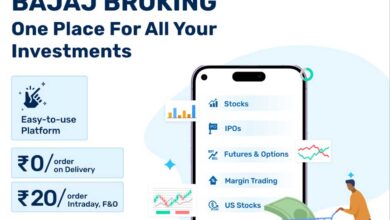
Mutual funds are a popular investment avenue for a myriad of reasons, and their accessibility is one worth noting. With modern tools, you can get started from the comfort of your home, and invest via multiple investment modes.
One of the modes of holding and investing in mutual funds is a demat account. While you may often hear about demat accounts with stocks, know that you can use them to invest in other avenues.
To know the benefits of holding mutual funds in a demat account and more, read on.
Is Demat Account Mandatory for Mutual Funds?
Before diving into the benefits, an important question to know the answer to is whether demat accounts are mandatory for mutual funds. Simply put, no they are not. A basic service demat account or any demat account is not necessary to invest in mutual funds.
While it is mandatory for investment in stocks, it is not for mutual funds. As such, holding your mutual fund investment in demat is voluntary. You can invest directly through the AMC or a registered mutual fund distributor or broker. That said, holding your mutual fund investment in a demat account does have a few notable benefits.
Benefits of Holding Mutual Funds in a Demat Account
For many, their demat account is accessible through an intuitive digital platform, and that alone has many upsides. However, there are other perks too, which are:
Easy Tracking and Monitoring
Like stocks, you can invest in multiple mutual funds of different AMCs. However, keeping track of this can be a hassle as you will likely receive intimation at different times. But with a demat account, you can track and monitor all your mutual fund investments from one place.
This makes it easier for you to know your investments’ current standing and act accordingly. It also helps ensure you don’t miss out on a good opportunity to secure great returns.
Moreover, via demat, you need not remember many credentials as all the information is available under one account. This helps ease the worry of remembering the account details for numerous accounts and access your information seamlessly.
Simple Transaction
With a demat account, you can invest and redeem your mutual fund investments in just a few clicks. You need not fill out or submit forms or visit branches to begin the process. This helps ensure you can take prompt actions to protect your finances.
Convenient Investment Process
To begin your investment, you only need to open a demat account, which is also fairly straightforward. Once you have your account ready, choose a fund you want to invest in and the amount you want to invest and make the payment.
This means you can finish the entire process online from the comfort of your home. Moreover, with instant account opening, you can invest whenever you want and ensure that you don’t miss out on a great opportunity.
In addition to the above, there are a few other benefits you can enjoy with a demat account. Some of these are:
- Automatic updates of any transaction you make
- Reduces the risk of loss or theft as securities are stored electronically
- Secure investing, trading, and redemption process
- Instant account activation, enabling instant investments
- Facility to pledge the investment as collateral for immediate loans
- Different account types, like the basic service demat account, to choose one that best suits your needs
Drawbacks of Demat Account
Although there are numerous benefits, a demat account has some disadvantages too. Some of these are:
Charges Levied
Although there are DPs that levy zero charges for account opening, there are other costs that you need to be aware of. These charges ultimately reduce your earning, making it crucial to ensure that you choose a DP with minimum charges.
Annual maintenance charge, also known as AMC, is a commonly levied charge. DPs levy this amount to maintain, i.e., update your demat account as per the transactions you make. In addition to this, there may also be a custodian fee and transaction charges.
Since these charges differ depending on the DP you choose, it is pertinent that you compare the costs and choose the most feasible option. Generally, the information about the charges is available on the DP’s official website and on the application form.
No Direct Option for Mutual Fund
Mutual funds come with two options – direct and regular. Direct schemes are where you invest directly with the AMC. On the other hand, regular schemes are the ones where there is a third party.
Generally, the involvement of third-party means increased costs, which can lower your returns. Since investing via demat means that you invest through an intermediary, you do not have the option of direct funds and only regular funds. This also means that your earnings may be slightly lower than that of a direct fund.
How to Invest in Mutual Funds Via a Demat Account
Investing in mutual funds is a simple process, whether you do it via a demat account or directly through the AMC. However, the process varies slightly depending on the mode you choose.
To invest through demat, you first need to have an account.
Here are some general steps you can follow to open a demat account:
- Step 1: Choose your depository participant
- Step 2: Go to their official website
- Step 3: Navigate to the demat account section
- Step 4: Find the account opening form
- Step 5: Fill out the form and upload the required documents
- Step 6: Submit the form
- Step 7: Save the account information you receive upon activation
Once you have your demat account, you can go to the DP’s app or website and place an order for the fund you want to invest in. Choose the SIP option, SIP amount, and other factors to complete your investment.
Once you make the payment, you will receive confirmation and updates about the units allocated to you. The allotment process can take a few days in some cases, and you can check details by signing in to your account.
Now that you know the benefits and other essentials of holding mutual funds in a demat account, invest accordingly. Choose an option that enables you to get the most value from your investment while keeping it secure.
While investing, you should also focus on diversifying your portfolio and mitigating the risk. Remember that for market-linked investments, you should rely on expert advice if you are not well-versed with the market trends.







